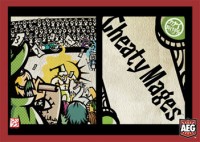
Cheaty Mages
Overview
Five fighters have entered the arena. Players (as unscrupulous mages) have each wagered on one or more of the contestants. As the battle is joined, Mages cast spells that weaken or strengthen the combatants under the watchful gaze of the Judge . When no more spells are cast, the spells are revealed and the fighter with the highest power wins – rewarding which ever mage bet upon them.
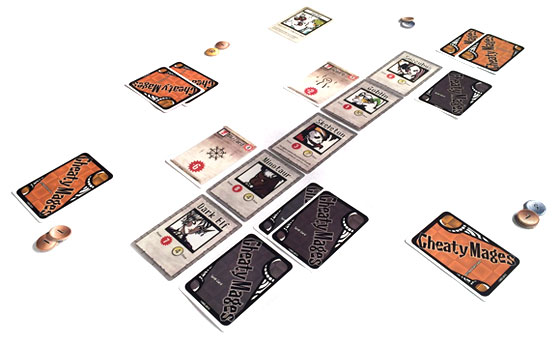
Gameplay
Each player is dealt spell cards. Five Fighter Cards are randomly dealt to the table face up in a vertical row. The top card from the Judge deck is then dealt face up and is judge for this round.
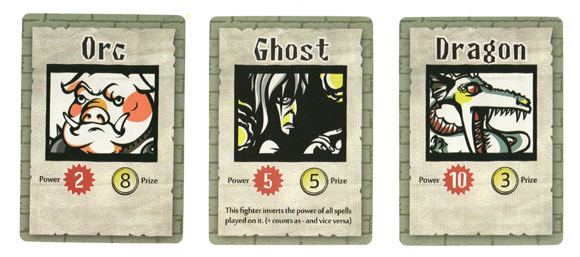
Next, players place bets on the fighter or fighters they believe will win by placing a one, two or three Betting cards face down in front of them. The number of each betting card matches the number of the fighters they hope will win.
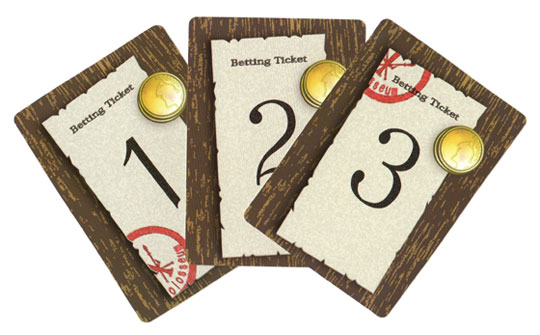
Players in turn cast spells on the fighters. Enchantments are played face down next to the fighter, Directs spells are played face up. Support spells usually resolve instantly and have many different game play effects. Most spell raise or lower a fighter’s strength score (the number in the red starburst). Forbidden spells may be … well… forbidden by the judge.
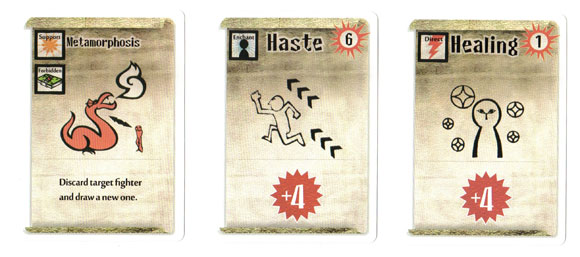
When all players pass the spells are revealed. Then the Judges get their turn. If the amount of Mana (the number in the upper right of the spell cards) on any particular fighter exceeds the level allowed by the Judge, then the Judge will intervene and either throw out all the spells on that fighter, or expel the fighter entirely from this round.
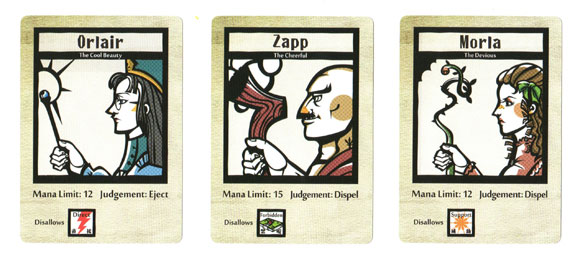
The fighter with the highest Power after all the spells affects are totaled wins the round and Mages that bet on that fighter get the Prize money ( the number in the yellow circle to the right of the fighter’s Power.
Players draw new spells and a fighter are returned to the deck and it is shuffled. Five new fighters enter the arena, A new Judge is flipped up.. wash.. rinse .. repeat .. for 2 more rounds. The Mage with the most prize money after three rounds is the Cheaty-est Mage of all!
Who would enjoy this game?
Final Thoughts
Seiji Kanai gives us a gem in this quick and easy card battle. It’s a blast to pump your own fighter and debuff your opponents’ picks even if it is in secret. Then add in support spells like Metamorphosis that changes out fighters mid round, or Dimensional Door that changes the current Judge and you have the potential to really screw you Mage competitors. It’s difficult not to tip your hand though, when you start conjuring lots of enchantments on one or two particular fighters. But if you get antsy you can play some face up Direct spells to throw you opponent’s off. It’s all up to the judge though and some spell happy mage might just eliminate your pick imply by throwing too much Mana its way.
Cheaty Mages is a tight, confrontational, often humorous and wildly entertaining fantasy magic battle, mixed with some gladiatorial and Las Vegas style wagering where the weakest combatant can win you the most clams. Originally released in 2008, this gem has finally made it to the states thanks to AEG. With some cool, creepy art by Noboru Sugiura – this game flips all the switches: Get playing in minutes, great replay value, great player interaction and just a pinch of strategy using a well-balanced variety of spells and affects. The only mark against is that the Fighters and Judges can get a bit repetitive. (Let’s seeeeeee an expansion!… please?)
Domo Kanai San.
User Reviews (3)
Add a Review for "Cheaty Mages"
You must be logged in to add a review.

Review Specification
Games I review are played by 3 people.
We have a social/adventure game persuasion.
Introduction
We purchased Cheaty Mages as a follow up to our countless Munchkin adventures. As far as games come they are very different, but maintained enough similarities for me to get my housemates interested.
Upon receiving Cheaty Mages I was pleasantly surprised at the subtlety of the box, it comes very well packaged and take up little space in our already burgeoning games cabinet.
Opening the box
Inside the box there were 2 shrink wrapped decks and a glossy rule book. Of course the usual pop-out tokens were waiting undisturbed in their sheets. The rules were laid out well and outlined the game, the information translated well into demonstrations to my girlfriend and housemate.
The Game/The Concept
Cheaty Mages is set in the stands of an arena where creatures do battle till the death. You and your “friends” are Mages, gambling Mages. You are looking to make a quick buck by betting on the outcome of the duels in the arena. But of course being Mages means that you can influence the outcome of the fight even from the comfort of your seat.
At the start of the game, 5 creatures are laid out, each with an individual power number and gold amount (The higher the monsters initial power, the lower the gold amount for them successfully winning and vice-versa). They are now considered the active ‘fighters’ in the arena. Then a judge, who oversees the fight is drawn, he/she will have certain restrictions and their personality will range from being extremely strict to passive and lenient.
Each player receives eight cards that can be used to alter the combat taking place in the arena. Displayed on the player’s cards is a mana cost, this relates to the aforementioned judges, each judge, depending on personality will have a Mana Limit. Should players exceed this limit by playing spells, the judge wades in with some nasty effects which either remove one fighter from combat or start dispelling the player’s spells.
The Mages(players) then proceed to place bets on who they think will win the duel, knowing full well they have the ability to manipulate the events that unfold. Bets are laid face down and you can bet on up to three monsters. (Place just one bet and you receive double the prize of the winner, place two bets and you get the printed total prize of the winner and finally place three bets and you receive 1/2 of the prize of the winner)
There are three types of cards in the game, direct spells, enchantments and support spells. Direct spells must be played face up alongside the monster the player has targeted, enchantments are placed face down and support cards generally aid the player by being able to remove spells or draw additional cards.
Direct and Enchantment spells will give various bonuses to monsters, one example would be Fireball which is a direct spell, so it’s played face up, costs 1 mana but gives a -4 penalty to the creature’s attack power.
As you can see, the basis for the strategy has now been laid.
The game ends when all players have passed, you can pass at any stage but are unable to rejoin the round’s action once you’ve done so. At the end of the round the enchantment cards are turned face up and each monsters total power is calculated. Of course then you have to take into consideration the judge’s mana limit. If a monster has had a spell total of 12 mana played on him but the judge only allows 10 then that monster will either be discarded completely or have spells removed. The successful bettor/s collect their winnings and the game proceeds to the next round, players draw up to 4 spell cards and play continues.
After three rounds whoever has the largest gold stash leaves the arena as a winner and no doubt heads off to blow his newly found wealth at a bar.
The Results/Summary.TL;DR
The game plays very well and provides room for strategy development. We enjoyed the first game and laughed throughout as we announced who we thought each other’s bets were on. The second game drew an eerie silence as each of us bunkered in to our seats visibly showing the cogs turning in our heads.
After the 5th game we’d already seen the games limited 10 fighters multiple times and wished for some variance, but the true beauty of the game lies in the large spell pool. With a wide range of direct/enchantment/support spells the game plays out differently each time, especially with the changing judges and their own restrictions. (Some judges ban the use of support cards too for example)
In my opening paragraph I declared some similarities to Munchkin, this relates to the way in which you can backstab other players, deploy sneaky mana boosting cards and generally make a mess of their well thought out plan. One element of game enjoyment for us has always been the ability to, for want of a better phrase, completely screw over another player. Cheaty Mages offers players a thought provoking game full of twists and turns. It’s one of those games where I can guarantee you will get a sulky player.
Criticisms
It’s been coming and I’ve largely stayed positive about the game because that most fairly reflects our feelings whilst playing, but.
The largest drawback – if you are unsuccessful in a round and lose your bets it can be very difficult to make up the difference. With some simple betting patterns a leading player can consolidate a winning position quite easily.
Way TL;DR
Cheaty Mages provides a fun thirty minute game in which players get a fix of some good old fashioned spell casting and tactical card playing. With a solid spell deck offering a multitude of combinations it provides decent longevity.
As mentioned before, try not to play this game with anyone prone to sulking, it can be very demotivating to face what feels like an insurmountable catchup to the leading player. If you have a good group of competitive players Cheaty Mages works very well, providing lots of laughs and evil glares.
Recommended if –
You want a quick easy to set up card game (under 30 mins)
You have happy, competitive friends who will battle for 2nd place just to not finish last.
You want to be able to be challenged in card placement
You enjoy tactically outplaying people
Not Recommended if –
You have sulky friends
You want a game to last 30 minutes or more
You plan on playing this every night
Cheaty Mages is about mages who have gathered to spectate (and manipulate) a grand duel of monsters. The mages observe the monsters entering the arena, place bets on who they think they will win, then they cheat for their gladiator of favor.
Winning
The goal of the game is to have the most money after 3 rounds of fighting.
Summary
The arena is set up but placing five random monsters and a random judge. Monsters range in power but the more power they have, the less winnings you get and vice versa. Therefore if you are looking for a big payout, you would chose the weaker gladiator. The judge sets the guidelines for the fight. They can range from a judge who day dreams and pays no attention, to strict judges who will dispell or suspend your gladiator for what they deem as “cheating.”
Before the fighting starts, the players need to place bets. You are given betting tickets to make your choices. Your can pick anywhere from 1-3 gladiators but the more you pick, the less the payout.
1 ticket – Double the reward stated on the monster.
2 tickets – Equal to the reward on the monster.
3 tickets – Half the reward on the monster.
You are not required to show what you picked, as you want to keep your competitors guessing. However you do need to show how many tickets you picked.
Once picks are in place, players take turns casting spells at the monsters. Spells have a mana power (not cost) and a spell type. These are important, as it can be directly effected by the judge that is in play. Most judges have a mana limit, so if enough spells with a high mana total are placed on one monster, the judge may dispell the spells or take the gladiator out altogether. Also if the judge disallows a certain spell type, you are not allowed to use those spells during the fight.
Most spells are direct effect, meaning you place the spell face up next to the monster for everyone to see. There are also enchantments that let you place spells face down next to the monster to keep your opponents guessing what you casted. There are both positive and negative spell effects that can be used during battle, amongst other spells that help you cheat.
Other options mages have during the spell casting phase, is to Pass or they can discard a spell to Identify Magic. If a mage passes, they are done for the fight, meaning they will hold onto their spells until the fight is over (these can be saved for the next fight). If a player chooses to use Identify Magic, they discard a spell to look at an enchantment that is face down.
When everyone is done casting, the spells are totalled up to see who the victor is.
Impressions
At first I was pretty skeptical of a (yet another) card game that I never heard of, but I had a lot of fun with it. It’s small and portable, the judges add a fun dynamic to card battling, and the gambling adds a nice alliance/nemesis feel where you need to find out who is helping you and who is not. It’s not uncommon to place your spells on creatures just to make your opponent think you bet on that monster, which adds some more fun and trickery. This game is also easy to learn, most of the things you need to know are already on the cards. So in conclusion, the game is inexpensive, easy to learn, fun for everyone, what are you waiting for?
By far one of my favorite games to play… while inebriated. Don’t get me wrong, I have had my share of good times laughing at others nuking their go to contender and healing my bread and butter, sober, but by far the best to play as a side along to a night sitting at the local pub sipping your, well for me, stout. Surprisingly a lot of strategy involved while simultaneously adding an element of chance (I know, chance and strategy = irritation) and bluffing your pants… well, clean off! Some of the spells are played face up for all to see, meanwhile some you have to play face down to hide your intentions (or give yourself away?), others are just flat out forbidden to play for a round. The betting element involved will give you a rush as you stake it all just to have someone reverse your spell or to replace a judge you placed all of you faith in with another who cares about the rules as much as a minimum wage earning pre pubescent teen in customer service (you get it.)… But… As fun as it is, there are only ten monsters with only one variant, the skeleton and ghost treat + as – and vice versa. I, personally, would like to see more monster abilities (such as succubus can have negative spells played on it by female players and positive by males or something like that). There are only eight judges, which are surprisingly diverse but still would like to see more. All in all, I recommend adding this game to your collection, the price tag is VERY reasonable, you will laugh, cry and come dangerously close to rage quitting just to clean up and play again and again. Easy to learn and quick and fun to play. As a side note… Color coated the various card types with colored vinyl backed card sleeves, I’m very proud of how it turned out.